Social Protection
Context
The State of the World’s Cash 2020 report found:
- Working with, through and alongside social protection systems is now considered key to strengthening the humanitarian-development nexus and humanitarians are increasingly active in this space
- Practitioners find that the three biggest challenges to effective linkages are: (i) lack of coordination between the actors involved, (ii) social protection systems are not designed to respond to crises, (iii) humanitarian practitioners lack expertise in social protection
- Critically, there is no ‘one size fits all’ solution to linking CVA and social protection. Trade-offs between efficiency, effectiveness, accountability, and sustainability must be considered to ensure the best outcomes for people living in crisis and depends on context, existing systems, and timeframe. Linking will not always be appropriate and social protection systems may not meet all needs. In many contexts, in the short to medium term at least, humanitarian programming will be required to fill gaps.
Current Priorities
The CALP Network has invested intensely in this thematic area over the last few years. We will continue to work closely with the SPIAC-B Working group on linking humanitarian (cash) assistance and social protection (formerly the Grand Bargain Sub-Workstream on Social Protection) and with the SocialProtection.org platform and the Online Community Social Protection in Crisis Contexts to develop evidence, produce capacity building materials and provide technical support to coordination actors.
Community of Practice
SocialProtection.org hosts a dynamic and collaborative online community of practice (CoP) bringing together individuals from diverse backgrounds interested in expanding social protection in crisis-prone areas. The CoP offers a space to exchange documents, insights, and news in order to progress and learn together. Its inclusive and member-led approach offers organisations and individual members a forum to increase learning and outreach, facilitating the exchange of experiences and expanding knowledge. A discussion group hosted by dgroups.org complements these activities by connecting users rapidly via email.
SPACE
There are a wealth of relevant resources from ‘Social Protection Approaches To Covid-19: Expert Advice’ (SPACE) published in the CALP library.
Featured content

Linking Social Protection and Humanitarian Cash and Voucher Assistance
Report
There is a growing momentum and body of work around the idea of developing stronger links between humanitarian cash and voucher assistance (CVA) and social protection (SP). This Briefing Paper for the CALP Network, based on a literature review, a survey, and interviews, is intended to inform the CALP Network’s overall approach in this area, and subsequently its capacity building and...

Linking Social Protection and Humanitarian Cash
Blog Post
The case for social protection to help people cope with shocks has always been clear and never more obvious than during the current Covid-19 crisis. These issues are currently playing out in real time as governments, donors and aid agencies scramble to find ways to get more help to more people to cope with the economic consequences of illness and lockdown. As the virus starts to take hold in...

Linking Social Protection and humanitarian cash and voucher assistance (CVA) – what do we really know and where to start? Findings from the CALP Network commissioned high level briefing paper at the time of COVID-19
Webinar
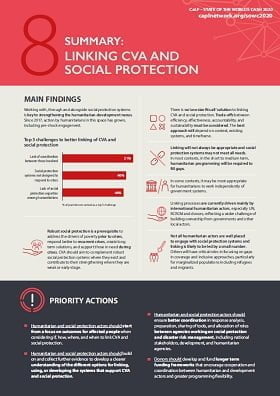
State of the World’s Cash 2020 Chapter 8 summary: Linking CVA and social protection
Report
Longstanding efforts to strengthen links between humanitarian CVA and social protection have been accelerated by the COVID-19 pandemic, with significant progress since the last report. CVA should aim to complement robust social protection systems where they exist and contribute to their strengthening where they are weak or early-stage. This chapter asks: ‘What opportunities and challenges...
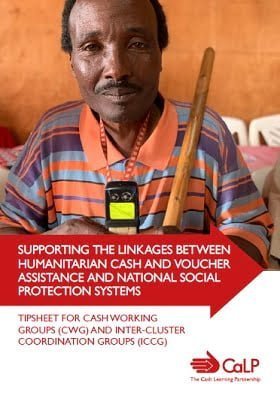
Supporting the Linkages Between Humanitarian Cash and Voucher Assistance and National Social Protection Systems
Report
This tipsheet aims to support country-level coordination efforts to strengthen the engagement between humanitarian coordination groups that implement cash and voucher assistance (CVA) and existing social
protection or disaster risk reduction coordination actors and groups. In particular, it seeks to offers inter-cluster and cash working group coordinators simple practical tips for engaging...
Case Studies

Linking CVA and Social Protection in the MENA Region – Crib sheet
Report
Building linkages between humanitarian cash and voucher assistance (CVA) and social protection (SP) has become an increasingly prominent topic over the past five years and the Middle East and North Africa (MENA) region has been at the centre of this evolution. The objective of this resource set (the crib sheet and 3, soon to be 6, regional case studies) is to ensure that the CALP Network...
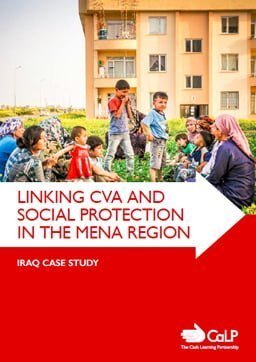
Linking CVA and Social Protection in the MENA Region – Iraq Case Study
Report
Building linkages between humanitarian cash and voucher assistance (CVA) and social protection (SP) has become an increasingly prominent topic over the past five years and the Middle East and North Africa (MENA) region has been at the centre of this evolution. The objective of this resource set (the crib sheet and 3, soon to be 6, regional case studies) is to ensure that the CALP Network...

Linking CVA and Social Protection in the MENA Region – Lebanon Case Study
Report
Building linkages between humanitarian cash and voucher assistance (CVA) and social protection (SP) has become an increasingly prominent topic over the past five years and the Middle East and North Africa (MENA) region has been at the centre of this evolution. The objective of this resource set (the crib sheet and 3, soon to be 6, regional case studies) is to ensure that the CALP Network...
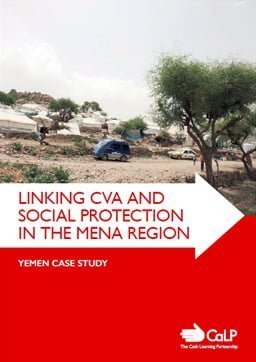
Linking CVA and Social Protection in the MENA Region – Yemen Case Study
Case Study
Building linkages between humanitarian cash and voucher assistance (CVA) and social protection (SP) has become an increasingly prominent topic over the past five years and the Middle East and North Africa (MENA) region has been at the centre of this evolution. The objective of this resource set (the crib sheet and 3, soon to be 6, regional case studies) is to ensure that the CALP Network...

Linking Cash and Voucher Assistance (CVA) and Social Protection – Occupied Palestinian Territories (OPT): Country Summary
Report
This country summary is part of a larger resource set, providing practitioners with examples of different approaches to linking CVA
and social protection.
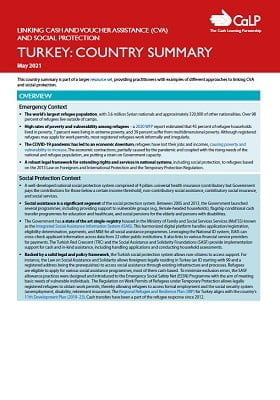
Linking Cash and Voucher Assistance (CVA) and Social Protection – Turkey: Country Summary
Report
This country summary is part of a larger resource set, providing practitioners with examples of different approaches to linking CVA
and social protection.
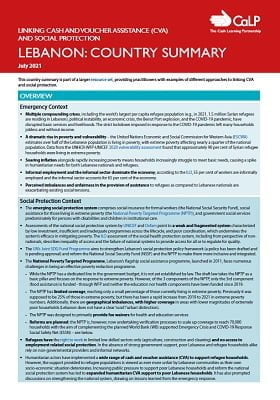
Linking Cash and Voucher Assistance (CVA) and Social Protection – Lebanon: Country Summary
Report
This country summary is part of a larger resource set, providing practitioners with examples of different approaches to linking CVA
and social protection.
Thematic lead
Latest
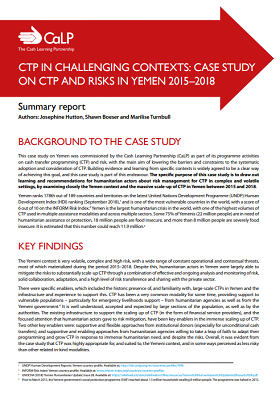
CTP in Challenging Contexts: Case Study on CTP and Risks in Yemen 2015–2018 – Summary
Report
Yemen is one of the most vulnerable countries in the world, and has long suffered from poverty, instability and vulnerability. The conflict, which has unravelled since late 2014, and, more specifically, since March 2015, has left 22 million Yemenis in need of some kind of humanitarian assistance or...

Social Pensions and their Contribution to Economic Growth
Report
This report for Uganda’s Expanding Social Protection programme details how old age pensions can be considered a foundation for a country’s strategic economic growth and the positive contribution pensions can have on individuals, families, communities and nations.

CTP in Challenging Contexts: Case Study on CTP and Risks in Yemen 2015–2018
Report
Yemen is one of the most vulnerable countries in the world, and has long suffered from poverty, instability and vulnerability. The conflict, which has unravelled since late 2014, and, more specifically, since March 2015, has left 22 million Yemenis in need of some kind of humanitarian assistance or...
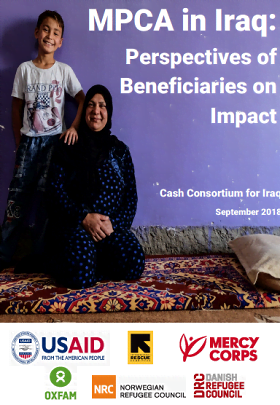
MPCA in Iraq: Perspectives of beneficiaries on impact
Report
Cash Transfer Programmes (CTP) have become a common feature of humanitarian responses in conflict and disaster settings, supported by a wealth of evidence that cash transfers are an effective means of meeting humanitarian needs, providing local markets are functioning and accessible. CTP without...
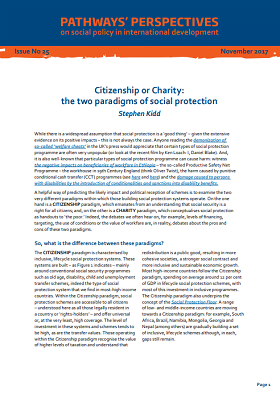
Citizenship or Charity: the two paradigms of social protection
Report
This report compares and evaluates two paradigms of social protection. Stephen Kidd explores the assumptions behind, and impacts of, the citizenship and charity paradigms he argues are at work in different contexts.

Terms of Reference – The Ethiopia Cash Working Group – November2017
Report
The Ethiopia Cash Working Group (ECWG) is a forum of stakeholders dedicated to improving the use and delivery of cash and voucher transfer programming in Ethiopia The overall objective of the group is to strengthen the coherence and quality of cash based interventions (CBIs) in Ethiopia through...

Final Evaluation of the DiRECT Response Emergency Cash Transfer Programme in Zambia
Report
In the past two years (2015 and 2016), Zambia experienced relatively harsh climatic conditions characterised by disruptive rains and the negative impact of El Nino weather patterns. Districts in the southern and western regions of the country were most affected. Many farmers in the affected regions were...
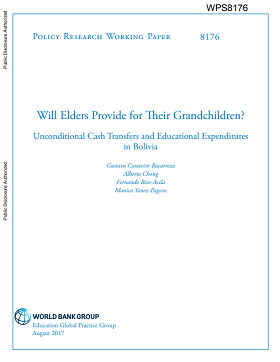
Will Elders Provide for Their Grandchildren? Unconditional Cash Transfers and Educational Expenditures in Bolivia
Report
This paper takes advantage of repeated cross-section household surveys and a sharp discontinuity created by the introduction of an unconditional cash transfers to elders.The paper evaluates the impact of these cash transfers on the educational expenditures for children within a household. The analysis...
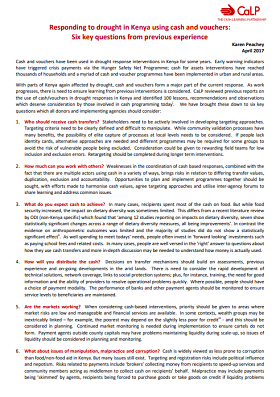
Responding to Drought in Kenya Using Cash and Vouchers: Six Key Questions from Previous Experience
Guidelines and Tools
the CALP Network reviewed previous reports on the use of cash/vouchers in drought responses in Kenya and identified 100 lessons, recommendations and observations which deserve consideration by those involved in cash programming today. We have brought these down to six key questions which all donors and...
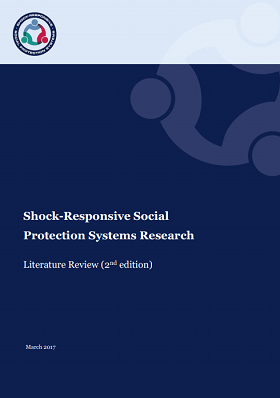
Shock-Responsive Social Protection Systems Research: Literature Review (2nd Edition)
Report
DFID has commissioned research into Shock-Responsive Social Protection systems, to further understand the nature of the interaction between social protection, humanitarian and disaster risk management systems and ways in which long-term social protection systems can be scaled up to provide support in...
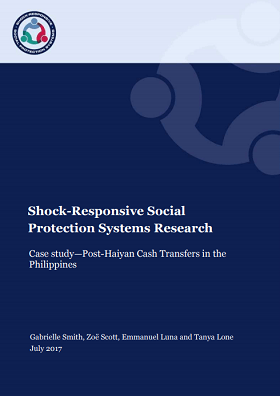
Shock-Responsive Social Protection Systems Research Case study—Post-Haiyan Cash Transfers in the Philippines
Report
This case study report focuses specifically on the experiences of using emergency cash transfers following Typhoon Haiyan and considers the wider social protection system, developments since Haiyan and future possibilities for shock-responsive social protection. A summary briefing note is published...

Challenging the System: Humanitarian Cash Transfers in Iraq
Report
Cash transfers have been used in Iraq to meet the critical basic needs of a highly vulnerable population, providing them dignity and flexibility in a context of uncertainty and economic need. Although Iraq is an appropriate context for the use of cash transfers, factors including government acceptance,...

Building on social protection systems for effective disaster response: the Pakistan experience
Report
How can social protection systems be used in disasters, as a complement to, or substitute for, humanitarian assistance? Oxford Policy Management (OPM) led a two-year research project investigating this question, looking at the role of social protection in both mitigating the impact of large-scale shocks...

Responding to Drought in Kenya Using Cash and Vouchers: Learning from Previous Responses
Report
This paper provides a summary of 100 recommendations, lessons and observations from evaluations that have looked at the use of cash and vouchers in drought responses in Kenya. The reports which were reviewed considered the use of cash and vouchers in drought related responses in urban and rural areas;...
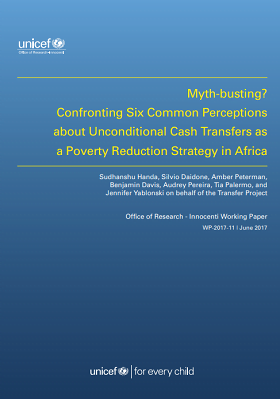
Myth-busting? Confronting Six Common Perceptions about Unconditional Cash Transfers as a Poverty Reduction Strategy in Africa
Report
This paper summarizes evidence on six perceptions associated with cash transfer programming, using eight rigorous evaluations conducted on large-scale government unconditional cash transfers in sub-Saharan Africa, under the Transfer Project. Specifically, it investigates if transfers: 1)...
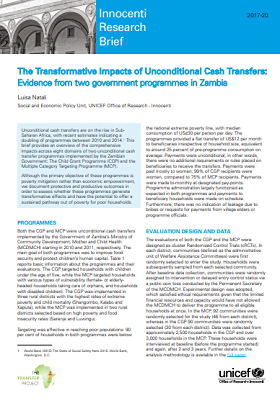
The Transformative Impacts of Unconditional Cash Transfers: Evidence from two government programmes in Zambia
Report
Unconditional cash transfers are on the rise in Sub-Saharan Africa, with recent estimates indicating a doubling of programmes between 2010 and 2014.This brief provides an overview of the comprehensive
impacts across eight domains of two unconditional cash transfer programmes implemented by the...

The use of CTP in Kenya: Reflecting on the 2016/17 Drought Response
Report
This workshop report is packed with useful ideas and information, reflecting the lively discussions which took place at a workshop in June 2017 about the use of CTP in the Kenya drought response. Discussions touched on multiple issues including coordination; cash transfer values; lack of awareness...

Scaling-up CTP in Somalia: Reflecting on the 2017 Drought Response
Report
This report summarises discussions that took place during a half-day workshop in September 2017. It built on issues identified as needing action in May, as outlined in the ‘Looking back to move forward: Building on learning from 2011 to strengthen the 2017 drought response in Somalia learning report’.

A buffer against the drought
Report
The Government of Kenya in partnership with DFID undertake a long term social protection program(Hunger Safety Net Program) in Northern Kenya reaching out to poor households with bi monthly cash transfers. So much investment has been put in this program including pre-registration and carding of...

Cash Tranfers for Food Security in Epidemics. A Review of the USAID Food for Peace Response to the Ebola Crisis in Liberia and Sierra Leone
Case Study
Over the course of 2015 and 2016, the United States Agency for International Development/Food for Peace (USAID/FFP)-funded cash transfer programming (CTP) in Liberia and Sierra Leone reached over 500,000 crisis-affected people with a vital lifeline to tackle food insecurity. Monitoring data indicates that...




